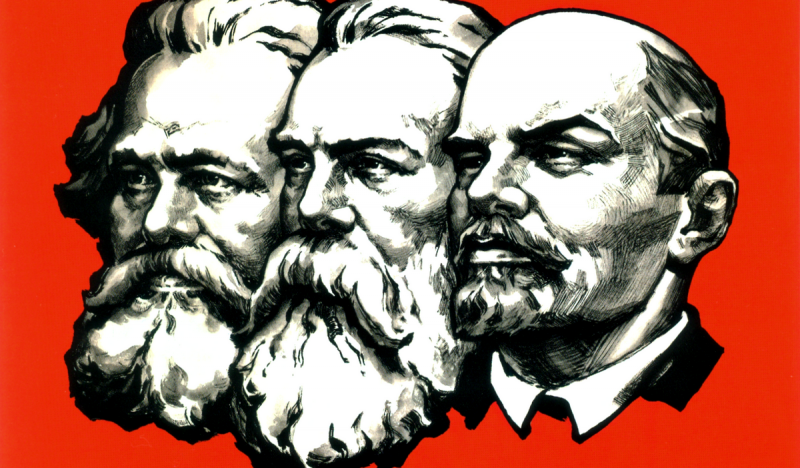Russian Barbarians: Why Marx and Engels Hated Russia
Karl Marx and Friedrich Engels, in whose honor streets and squares are named in our country, have never been distinguished by special sympathies for Russia and the Russian people. It was due to features political situations in Europe at a time when the founders of Marxist theory wrote their work.
Firstly, Marx and Engels were representatives of the Western cultural tradition, which was always superior to countries and peoples that were not members of the Romano-Germanic world. In the eyes of the Germans, French, British, the Slavs never looked like full-fledged Europeans. The classics of Marxism did not stint in expressions in relation to the Russian and other Slavic peoples. Some sayings of Marx and Engels could be envied by Hitler propagandists. Thus, the classics of Marxism called Russia a barbaric country, and the Slavs - barbarians, emphasized that all Slavic languages degenerated into a "common folk dialect." But the fear of Europeans before the numerous Slavic peoples joined in contempt. Both Marx and Engels accused Russia of striving for world domination.
Secondly, in the middle and second half of the XIX century, the Russian Empire significantly strengthened its position in Eastern Europe, becoming a serious competitor to England, France, Austria-Hungary, and then Germany. First of all, Russia competed with the West for political influence in the Balkans. At the same time, the Russian Empire actively fought against revolutionary movements in Eastern Europe, which caused self-hatred from the European left intelligentsia. Our country was perceived as a "strangler of freedom" of Slavic peoples, primarily Poles. Marx and Engels, although they were smart and educated people, could not rise above the typical stereotypes of their time and shared a common European attitude towards Russia. If Marx and Engels were told in due time that the revolution, and even under the banner of Marxism, would happen in Russia, they would be very surprised and, probably, would consider such forecasts a complete madness. After all, being absolute Eurocentrists, Marx and Engels believed that only the Western world could bring progress to humanity.
Thirdly, the negative attitude towards Russia was also caused by the fact that it was precisely the Russian populists and anarchists who opposed Marxism in the revolutionary movement at that time. At one time, Mikhail Bakunin was the main rival of Marx, and Marxism did not enjoy influence among the Russian revolutionary intelligentsia for a long time. This circumstance also influenced the position of two thinkers regarding Russia and the Russian people.
After several decades in the Russian Empire, the first democratic February, and then the socialist October revolution took place. Russia became the country that was destined to carry out a contradictory social experiment and, moreover, lead other countries. It is thanks to the events in Russia in 1917 that the world has changed beyond recognition. By the way, changes in Europe, including a significant improvement in the living conditions of the European working class, were caused precisely by the events in Russia and the fear of European elites before the revolutionary experience of our country.
Firstly, Marx and Engels were representatives of the Western cultural tradition, which was always superior to countries and peoples that were not members of the Romano-Germanic world. In the eyes of the Germans, French, British, the Slavs never looked like full-fledged Europeans. The classics of Marxism did not stint in expressions in relation to the Russian and other Slavic peoples. Some sayings of Marx and Engels could be envied by Hitler propagandists. Thus, the classics of Marxism called Russia a barbaric country, and the Slavs - barbarians, emphasized that all Slavic languages degenerated into a "common folk dialect." But the fear of Europeans before the numerous Slavic peoples joined in contempt. Both Marx and Engels accused Russia of striving for world domination.
Secondly, in the middle and second half of the XIX century, the Russian Empire significantly strengthened its position in Eastern Europe, becoming a serious competitor to England, France, Austria-Hungary, and then Germany. First of all, Russia competed with the West for political influence in the Balkans. At the same time, the Russian Empire actively fought against revolutionary movements in Eastern Europe, which caused self-hatred from the European left intelligentsia. Our country was perceived as a "strangler of freedom" of Slavic peoples, primarily Poles. Marx and Engels, although they were smart and educated people, could not rise above the typical stereotypes of their time and shared a common European attitude towards Russia. If Marx and Engels were told in due time that the revolution, and even under the banner of Marxism, would happen in Russia, they would be very surprised and, probably, would consider such forecasts a complete madness. After all, being absolute Eurocentrists, Marx and Engels believed that only the Western world could bring progress to humanity.
Thirdly, the negative attitude towards Russia was also caused by the fact that it was precisely the Russian populists and anarchists who opposed Marxism in the revolutionary movement at that time. At one time, Mikhail Bakunin was the main rival of Marx, and Marxism did not enjoy influence among the Russian revolutionary intelligentsia for a long time. This circumstance also influenced the position of two thinkers regarding Russia and the Russian people.
After several decades in the Russian Empire, the first democratic February, and then the socialist October revolution took place. Russia became the country that was destined to carry out a contradictory social experiment and, moreover, lead other countries. It is thanks to the events in Russia in 1917 that the world has changed beyond recognition. By the way, changes in Europe, including a significant improvement in the living conditions of the European working class, were caused precisely by the events in Russia and the fear of European elites before the revolutionary experience of our country.

Information